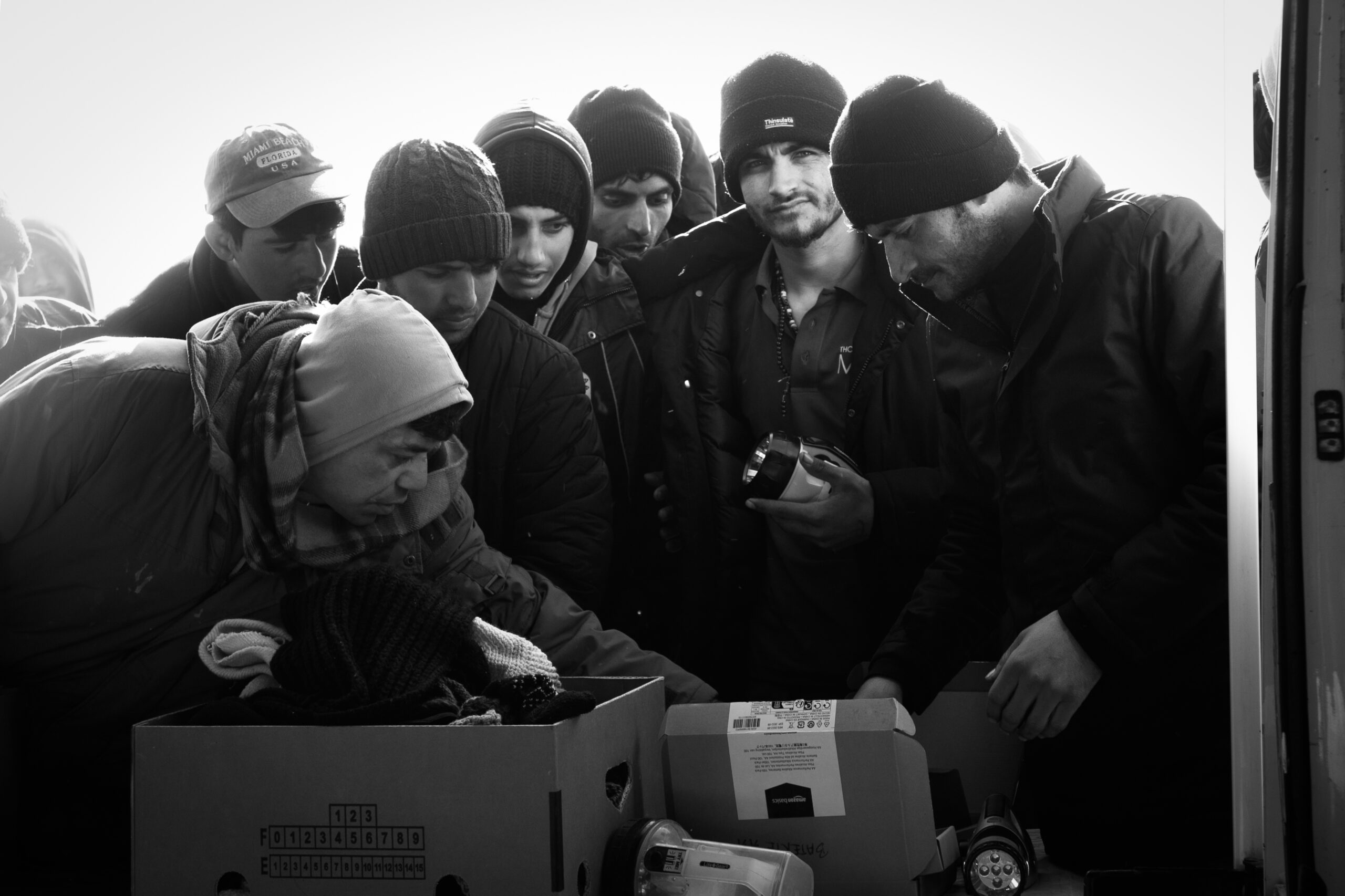Help 4 Dunkerque is something you know at least by name, maybe through their famous October party, a festive moment that helps cover the financial fees of the year’s activities.
So, what is H4D about ? It all started with a personal initiative, in the fall of 2020. The association was then founded on values such as mutual aid and solidarity with the migrants of the Grande-Synthe camp, in the Dunkerque suburbs. This area is called by the refugees themselves « The Jungle ». Fields of mud, precarious shelters, no water, no toilets. To discuss this complex area hit by constant State violence, we met with Chloé, an active member of H4D.
Huge thanks to Robert Ciszak for his photographies of last winter !
| By Polka B. & Laslav’ / Photos : Robert Ciszak / Illus : Mademoiselle Pin / Translated by Julie
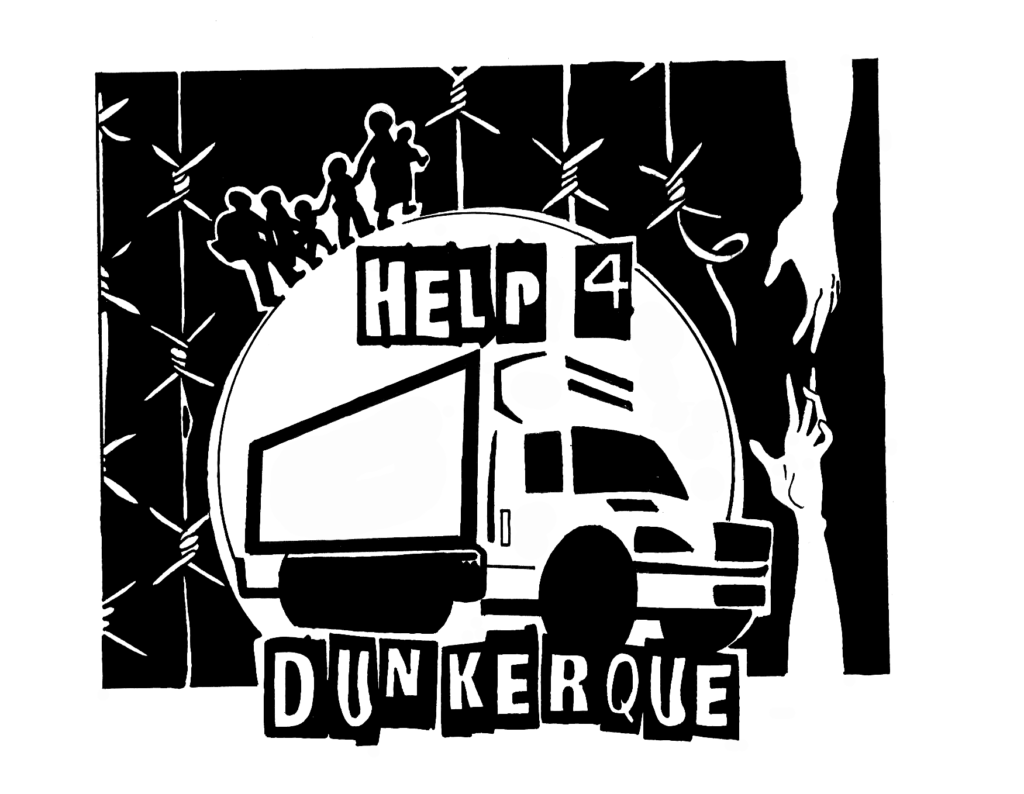
What’s the Calais Jungle ? (since 1999)
The term « Calais Jungle » refers to the whole set of precarious installations, slum areas and camps of migrants and refugees that were built since 1999 in Calais, Sangatte and Coquelles, near the port area and the French entry of the Channel Tunnel. Even though the Interior Ministry announced its « closing » in 2016, the area actually never was deserted by the migrants, despite a constant harassment against them (be it bureaucratic, politic or police induced —or all of the above).
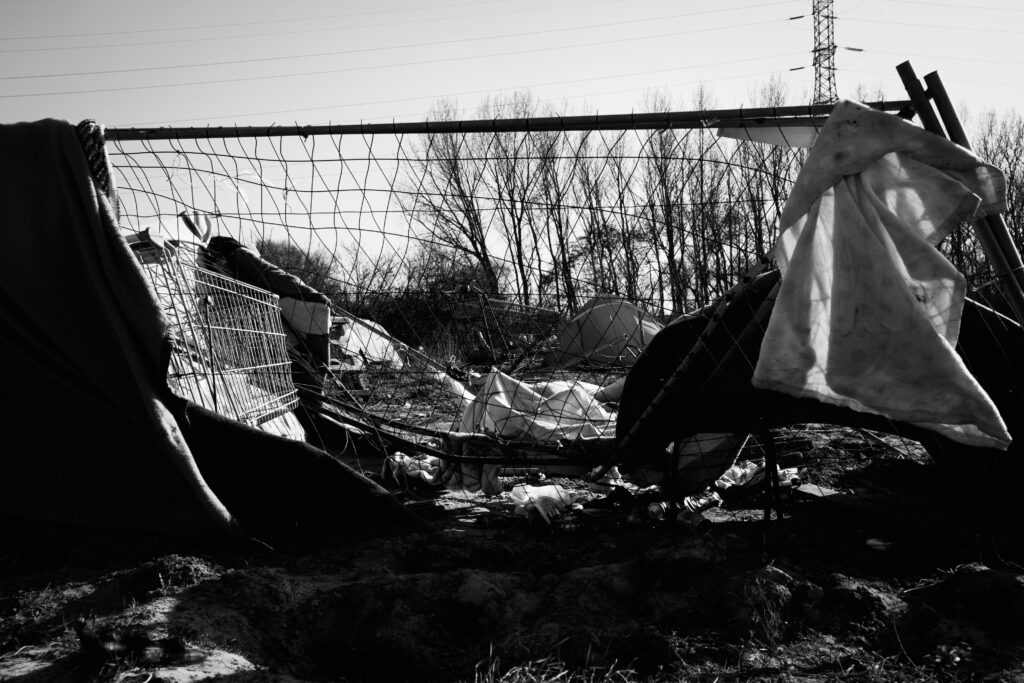
What’s the Dunkerque Jungle? (since 2005)
The Grande-Synthe camp (previously called « Basroch Jungle ») — located in the town of Grande-Synthe, in the Dunkerque suburban area — is a refugee camp that gathers people that are stuck at the Franco-British border. This camp is less extended than the one in Calais, and it is situated near the beach. In 2017, its population was estimated to be around 2000 people, a large majority of which were men. They are mostly Afghans, Iraqis, Syrians, Eritreans, or Iranians.

Interview : Chloé (Help 4 Dunkerque)
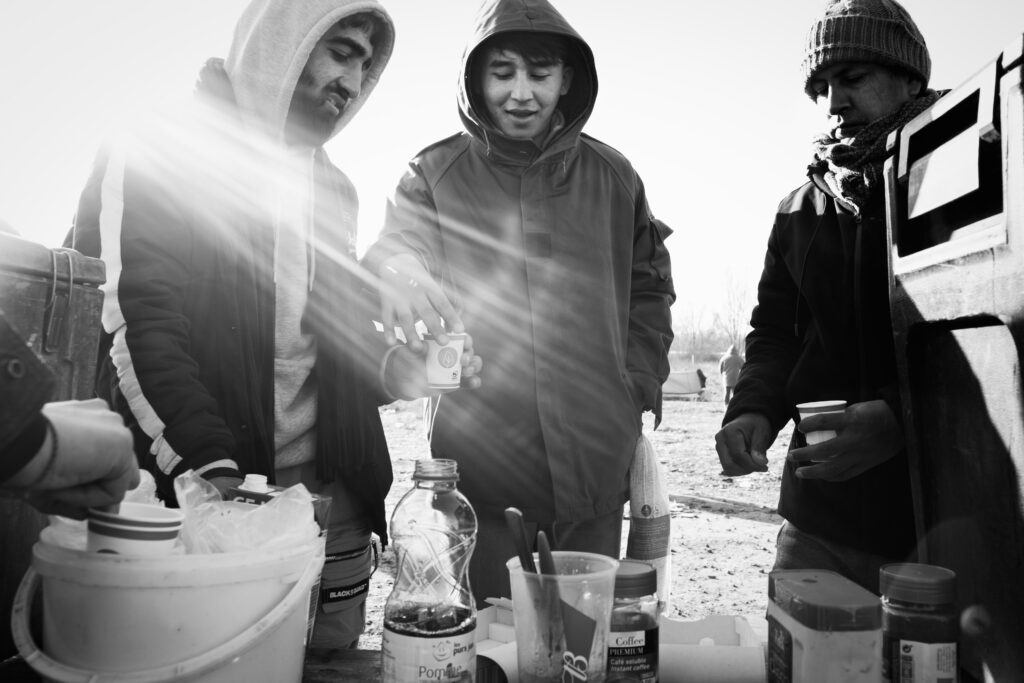
How was the association Help 4 Dunkerque (H4D) born? Why concentrate your activity in this city?
Our friend Clio is at the source of the association. She had seen pictures of refugee camps that had deeply shocked her. She quickly decided to go there with a few Italian friends from the No Borders TV organisation. They were used to organising solidarity convoys. I think they really briefed her about the logistics aspects of it. It gave her the courage to gather her own network to create a collective project. And it worked really really fast ! If she has a super power, there it is !
Her enthusiasm makes everyone follow her. That’s what happened with me… It was an occasion to do something concrete after the Covid period. Also, I must precise that we live in a truck. This way of life makes it impossible for us to commit on long periods. We like to stay mobile. With this association, it is possible for us to give everything for a month, then leave the place and come back later. It’s really adaptable. For us, it is the best way to commit in the long run.
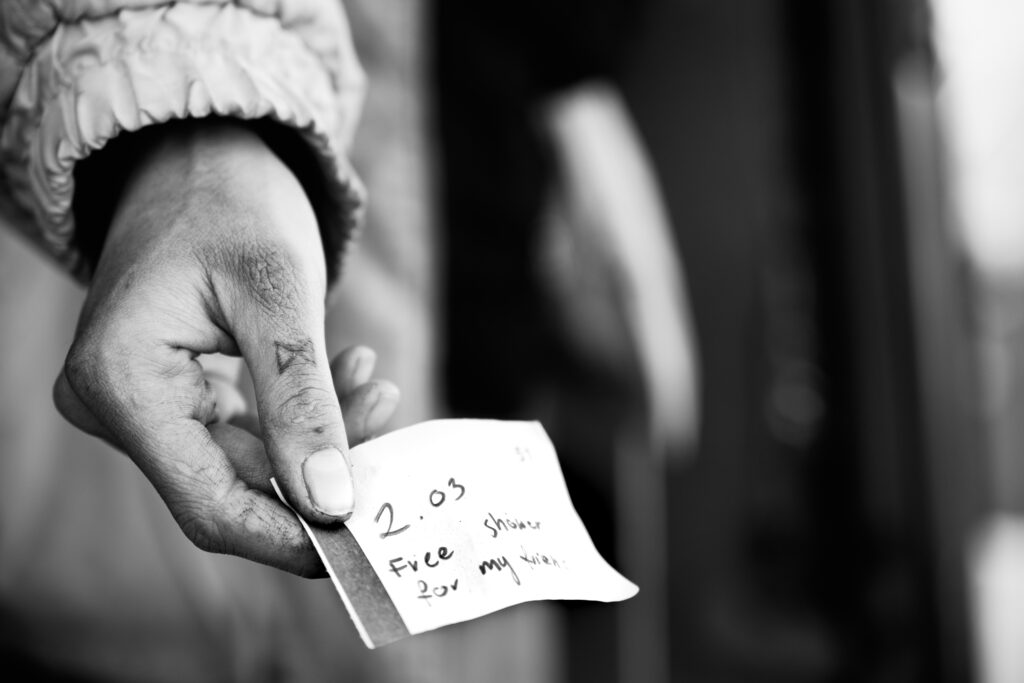
What the objectives of H4D?
In the beginning, the association was meant to bring stock at the camp : blankets, tents, clothing… It was the priority. But with the years, we built more stuff, like the shower-truck, which is a crucial installation !
There used to be no access to showers except for the nearby stadium’s showers, which were only accessible once a week. We’re talking about hundreds of people without access to hygiene or intimacy. And of course there was no hot water in the winter… You have to seen the smile on people’s face when they get our of the shower-truck !
How do you gather all this material?
We organize a big event every year in October. It allows us to gather money just before we leave for the winter. And not just money. Some people give donations all year long. They trust us and it feels good ! We also use these funds to pay for the association’s material needs (gazoline, etc.).
As we get more experimented, we get more financially involved in communication. Because, unlike a lot of associations, we are present on the camp all day long (for 8a.m. to 6 p.m.). We are a real relay for people in terms of transmission and information. We redirect a lot of people towards other associations according to their needs. We also do a lot of prevention about the risks of crossing the border by ship.
I really care about this : we are not a distribution machine. It is a place of transit, but the human relationship is important.

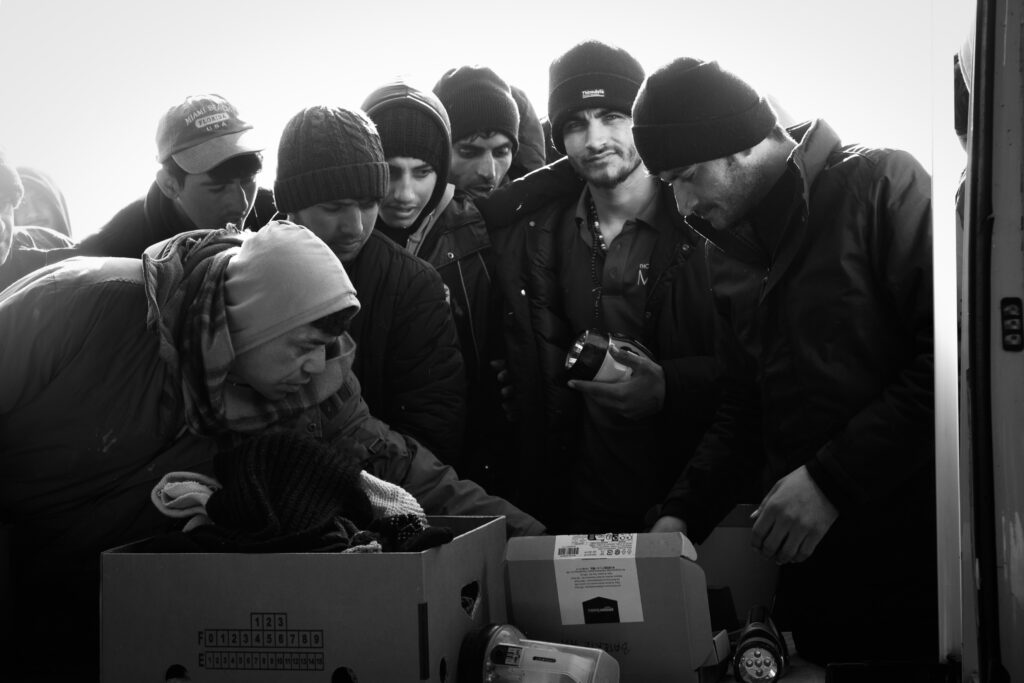
Why is it that the majority of people on the camp are men?
Some associations specifically take care of the women and children. We see them less because this population is quickly moved off the camp, even if they stay in the region. In Grande-Synthe, we find a majority of young men, around 20 years old. They are mostly Kurd or Afghan.
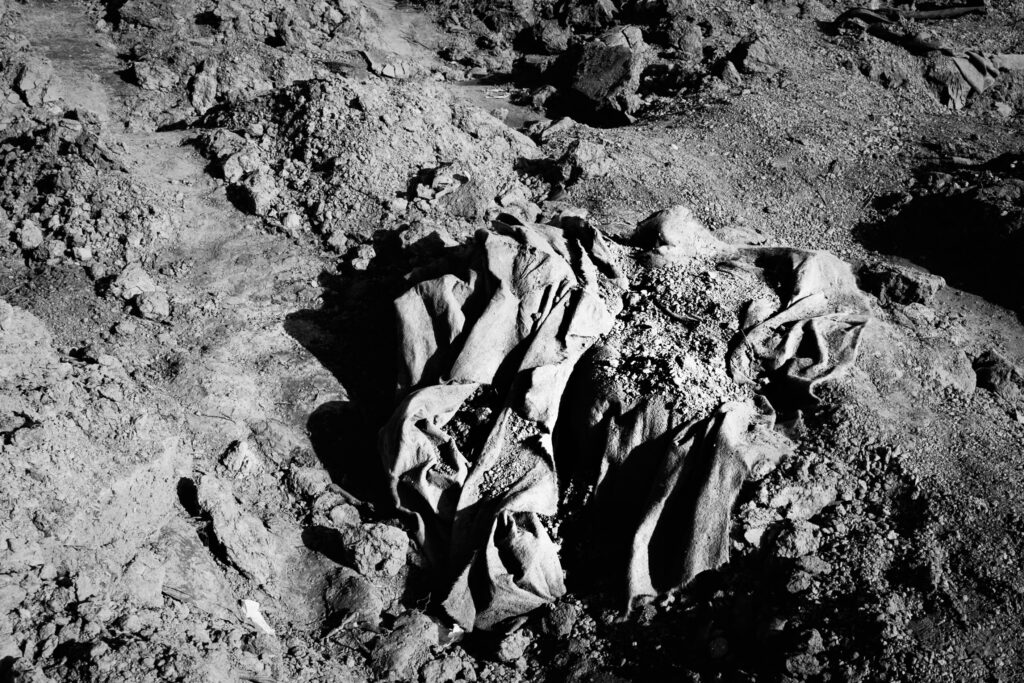
Can you tell us about the harassment that the refugees go through on a daily basis? What about the constant displacement of these population in order for the authorities to avoid what they call « fixation points »?
A few years ago, some associations had managed to build « concrete » installations in Calais. In Dunkerque, this is absolutely impossible. Any attempt of construction is annihilated in the second.
This harassment is political, it is a shameless psychological violence perpetrated by established power. The conduct is always the same.
They trigger the eviction at 7 a.m. Then, the cops « cleans up » the site until midday (as if it would turn « unsanitary » without their intervention…). At 1 p.m., the refugees come back to install their tents on the exact same spots ! It is a strategy intended to exhaust them. They try to dissuade them to stay on site for too long. But what the cops don’t understand is that people do not want to stay there. You have to be there to get it. It is a transit zone, it’s really « ghetto » ! People stay there one or two weeks, maximum…
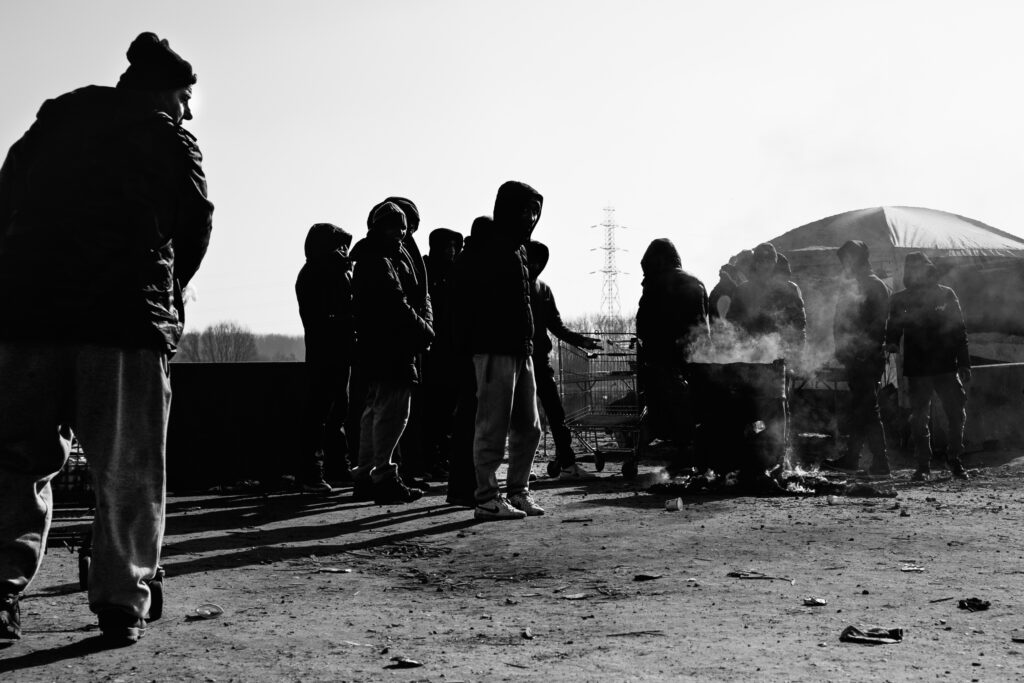
Isn’t it just a big communication operation destined to show to the British government that France manages its money « as it should »?
It’s certain. In the end, this evictions are also made to exhaust associations like ours. It’s always new blankets, new tents to distribute once again. And it goes further ! They don’t hesitate to give us tickets because our trucks are parked on the side of the road during the distributions (when they closed the parking area so that we couldn’t park there…).
They want to destroy the mutual aid that we are building. It’s that simple. And about British money, I think they’re enjoying themselves. They invest in high-quality material, such as quads to go in the dunes, to do their so-called sighting…
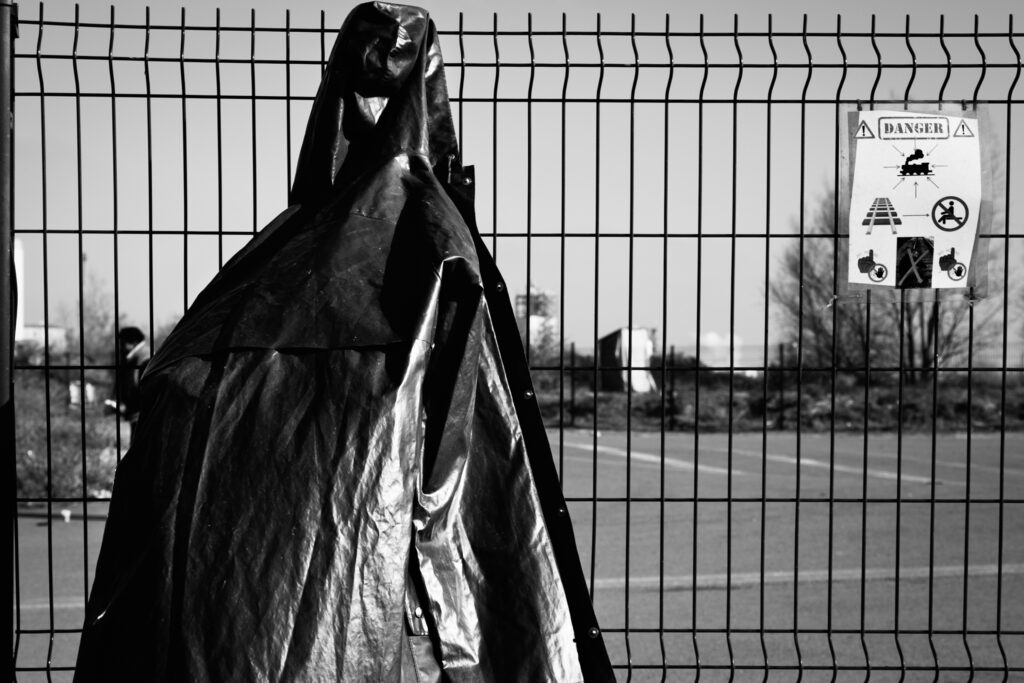
Peux tu nous parler des hiérarchies entre réfugiés ? On nous a parlé de réseaux de business qui régulent aussi la vie du camp, ce qui paraît inévitable.
The first time we came on site, two experienced association members briefed us. They told us something that I never forget to this day : « don’t forget not to judge ». What would we have done in their place ? We know that some people do business on the backs of others. But this is an extreme survival context. It is a micro-village, with its own rules. We try to be comprehensive towards these situations. They find arrangements and that’s normal. It can be for cigarettes, SIM cards… What you have to understand is that not all migrants have the same degree of poverty. Some of them have budgeted their travel. Some go to the nearby Decathlon store to buy their own tent.

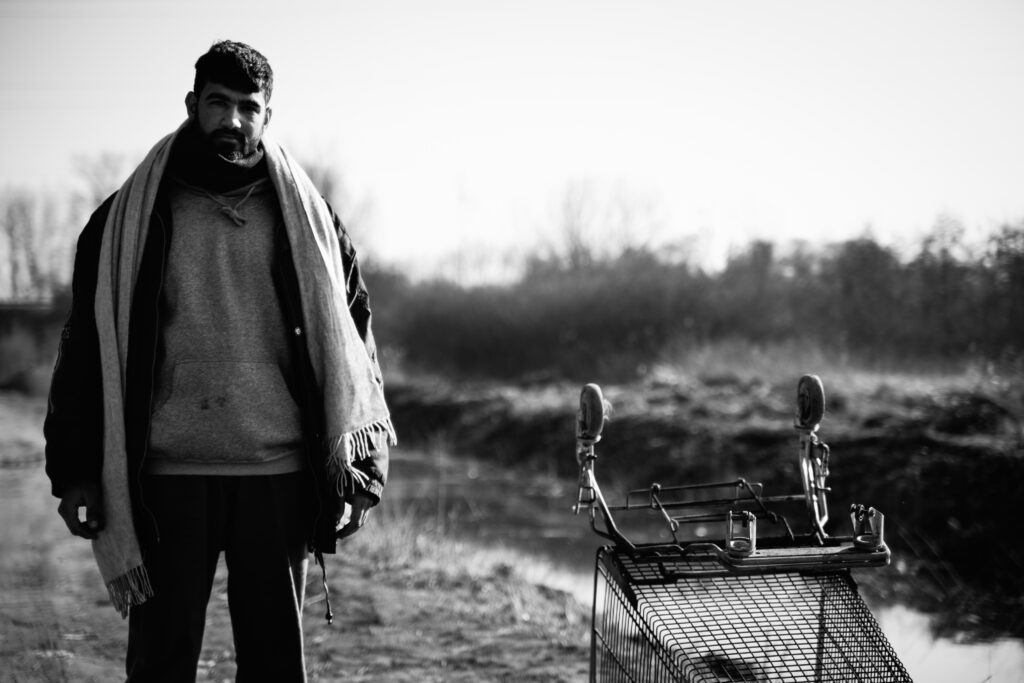
What is the profile of the members of Help 4 Dunkerque?
We are from the alternative milieu, the squats.. Mostly from the south-west and from Bretagne. We are in our thirties. Some are French, some Italian, Polish, Dutch, Spanish…There are a lot of intermittent artists that manage to find free time during the year to come help.
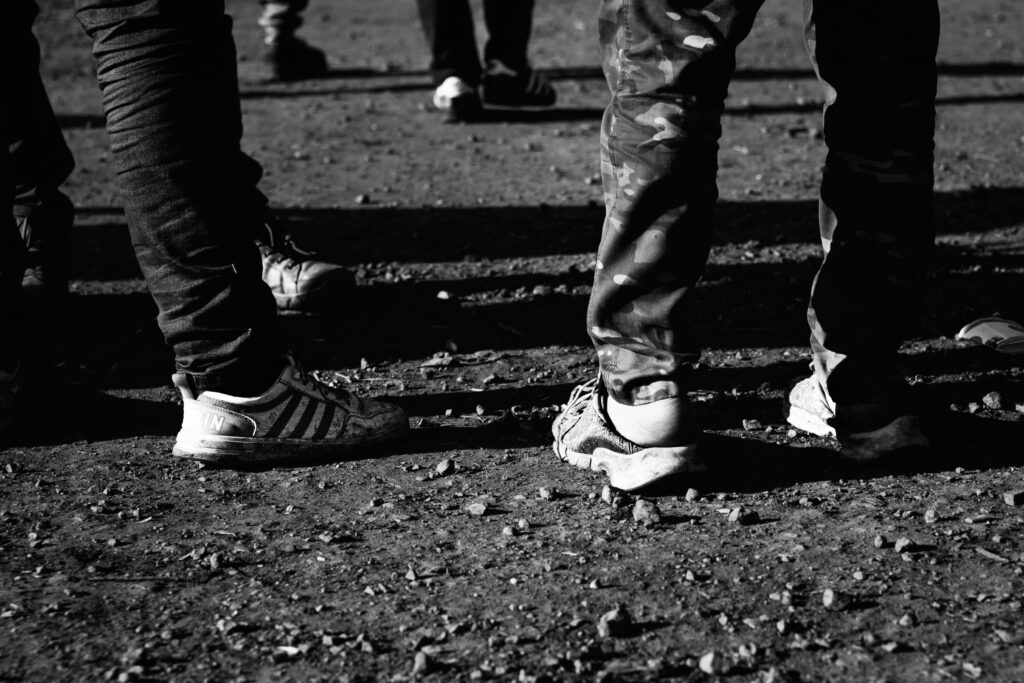
How do you stay focused on you objective with such an important turn-over?
In the past, we stayed to full months on site. This time, we stayed for 5 months, with less people present at the same time (approximately fifteen people), but more spread over time. Next winter, we will have one female referent per month. I use the feminine [« référente », in the original French version of the interview ; translator’s note (TN)] because the bureau is mostly composed of women. It’s difficult to plan in the long term. It’s psychologically intense.
For me, it’s impossible to stay more than two months. Even one whole month… it’s complicated. Since it’s an unpaid job, we work 10 hours a day, 7 days a week. No one does this at work ! You have to take care of yourself too. Like take at least one break day per week, for instance. It makes us more efficient. And more useful.
H4D are a kind of pirates in Grande-Synthe ! How do you interact with the bigger subsidised associations?
The human relationship is the most important thing. We could talk about Utopia 56, which is a rather important structure. We get along with them pretty well, because their on-site coordinators are really cool. We consult each other, we help each other out. In the beginning we were kind of wary, that’s true. But in the end, once on site, le relations change. We’re in the same stuff.
Can you tell us about your H4D party in October?
Yes ! It’ll take place in the south-west, near Cahors. This event helps gain visibility and gather donations. But above all, it gives us strength ! I take care of the entry and the reception. It is such a pleasure to welcome 400 people at a party that you built with your own hands ! It’s also the occasion for us members of the association to share a festive moment together. It’s important to know each other in this kind of context too. And… Party is also a part of our identity 😉

Last minute info!
The shower-truck of the H4D association has an accident! R.I.P! Help 4 Dunkerque is collecting funds to build a new one. If you want/Can help them on this project, here’s the kitty link. Thanks a lot!
www.helloasso.com/associations/help-4-dunkerque/formulaires/1
Mail > help4dunkerque@proton.me
Site > help4dunkerque.wordpress.com
